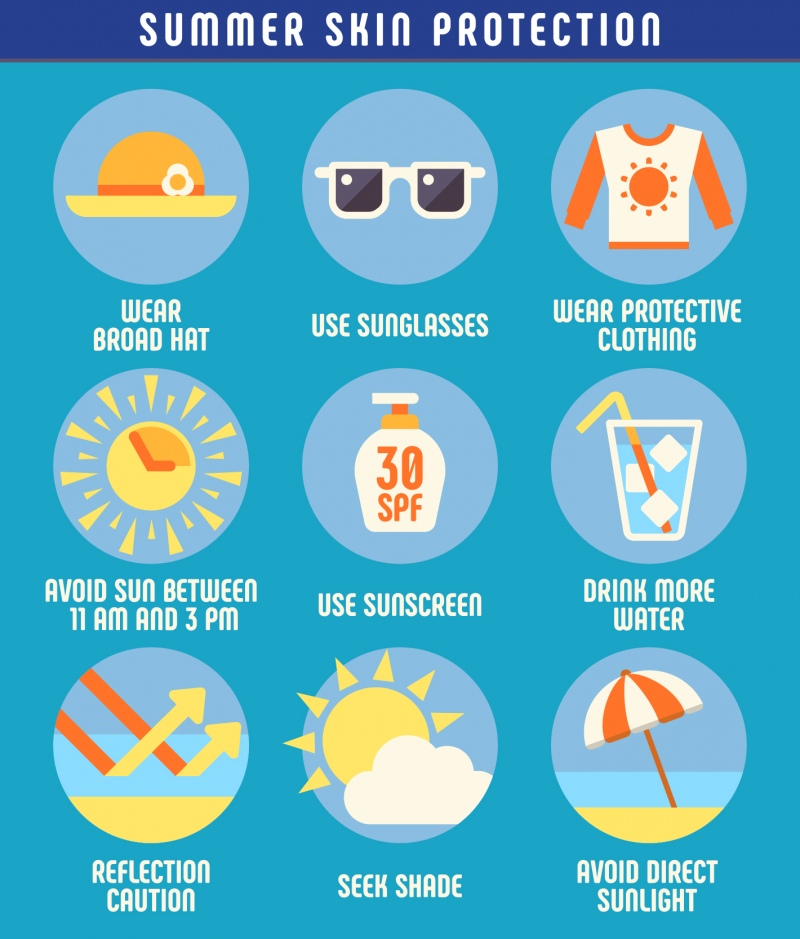
How to prevent skin from sunlight?
Beauty Tips
HD Medical Team
on Sun, Jan 12 2020 07:52 AM
2632 Views
No recommendations yet !!!
Sunlight is one of the common thing we encounter during our day to day life. Sunlight has very useful effects to human health as it is the important source of Vitamin D to us. Sometimes long exposure to sunlight also becomes harmful. Here we will discuss the useful as well as harmful effects of sunlight.
What are effects of sunlight on body?
Positive effects:
- Vitamin D: Vitamin D is involved in maintaining healthy bone strength. Exposure to the ultraviolet light from the sun, stimulate its production.
- Enhancement of the mood: Sunlight increases the levels of serotonin in the brain, which improves mood.
- Treats Seasonal Depression (commonly referred to as Seasonal Affective Disorder): In certain people, the lack of sunlight in the winter seems to trigger depression.
- Relieves Stress
- Improves Sleep: Sunlight exposure impacts melatonin production on brain, which tells your brain when it is time to sleep.
Negative effects:
- Effect on eye: Long-term, unprotected exposure to ultraviolet light from the sun can damage the retina.
- Heat Exhaustion
- Heat Stroke
- Sunburn
- Heat rash
- Skin Cancer: The consequence of long-term exposure to the sun is the development of skin cancer. The sun damage to the skin develops over years, so the older you are, greater the risk of developing skin cancer.
- Wrinkles/Aging: Sun exposure is a significant factor in developing wrinkles and time of their appearance. UV light damages collagen and elastic tissue in the skin.

Image source: sunsaferx.com
What are the effects of sunlight on dark and light skin?
Dark skin:
Dark skin is rich in melanin pigments, especially eumelanin. Dark complexions have both advantages and disadvantages. The advantages being:
- The dark pigmentation protects from DNA damage and absorbs the right amounts of UV radiation needed by the body.
- Dark pigmented people have a lower chance of developing skin cancer and conditions related to folate deficiency, such as neural tube defects.
The disadvantage is that they are very susceptible to vitamin D deficiency due to reduced vitamin D synthesis.
Light skin:
Light skin has little eumelanin pigmentation. The advantage of light skin people over the dark complexion is that, they have more Vitamin D synthesis. The disadvantages are:
- More susceptible to harmful UV rays of sunlight.
- With high exposure, increase the risk of sun burn.
- They have higher chance of developing skin cancer and conditions related to folate deficiency.
- With repeated exposure to strong UV radiation, the ageing process fastens with increased wrinkling and pigmentation anomalies
What are the ways to protect skin from sunlight?
- Limitation of exposure: Limiting the exposure time under direct sunlight prevents from harmful UV rays. Also try to avoid peak sun hour time (10 am to 4 pm) when the UV rays are strongest.
- Seeking shades: Use of umbrella and other shades when outdoor(though it doesn’t provide full protection).
- Vitamin D and sunlight exposure: Take a stay in early morning sunlight for the Vitamin D. Its not that we get Vitamin D from sunlight but it only stimulates our skin to produce Vitamin D. 15 - 30 minutes of exposure is all you need for vitamin D production. Vitamin D production depends on the age, how dark your skin is, and how strong the sunlight is. Avoid over exposure for vitamin D synthesis.
- Wear sunglasses that block UV rays: UV-blocking sunglasses are important for protecting the delicate skin around the eyes, as well as the eyes themselves.
- Wear hats on a regular basis: Hats with brims around helps to protect face, scalp and neck.
- Clothing: More skin you cover, better the protection. Wearlong-sleeved shirt and long pants if possible. Dark clothing with tightly woven fabric blocks more sun than white or loosely woven fabrics.
- Foods: Carotenoids (eggs, carrots, yam), natural plant pigments found in many fruits and vegetables, can help protect eyes and skin from sun damage. It a great way to provide a natural boost of sun protection.
- Stay hydrated: Drink plenty of water.
- Sunscreens:
- Sunscreens with broad spectrum protection (against both UVA and UVB rays) and with sun protection factor (SPF) values of 30 or higher are recommended.
- Check the expiration date before use.
- Generously apply it at least 15 minutes before being in the sun. Use it to cover all exposed skin.
- Reapply sunscreen at least every 80 minutes, and more often if you’re sweating or swimming a lot.
- Avoid use of sunscreens for below 6 months babies. Shade and clothing are the best ways to shield babies from the sun.
- If you are on any medication, be aware of medication side effects, some medication may increase skin sensitivity to sun.

Image source: no-ad.com
When to see doctor?
Visit to a doctor is recommended if you notice any change in color, texture, and pain, warm on touch, appearance of blisters, itching and fever.



Leave a comment